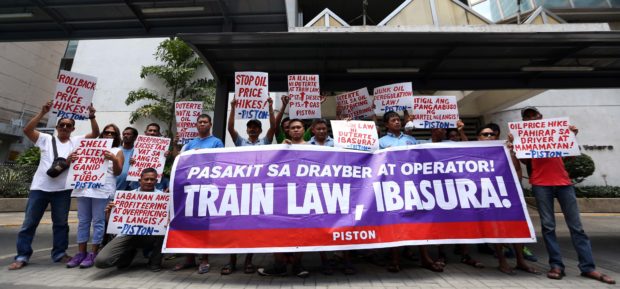Convene wage boards, labor urges gov’t

NO TO TRAIN LAW Members of a militant transport group protest against the latest round of
oil price increases and the tax reform law in a picket in front of the offices of Shell Petroleum Corp.
in Makati City on Thursday. —LYN RILLON
Calls to convene the regional wage boards and repeal a provision of the Tax Reform for Acceleration and Inclusion (TRAIN) Act have mounted as prices of basic goods soar in the wake of rising global oil prices and the imposition of an excise on fuel that unknown to many is slapped with another tax.
Amid these calls, Malacañang defended anew the TRAIN law, which took effect on Jan. 1, saying it did not cause the fuel price increases.
The National Anti-Poverty Commission (NAPC) is seeking the scrapping of part of the law imposing the 12-percent VAT on the excise on fuel, while a labor group is calling on the 17 regional wage boards to grant workers across-the-board pay increases.
Purchasing power eroded
Wage boards are mandated to adjust wage rates due to supervening conditions affecting the capacity of workers to cope with inflation, said the Associated Labor Unions-Trade Union Congress of the Philippines (ALU-TUCP).
Article continues after this advertisementIn a statement, Gerard Seno, ALU-TUCP national executive vice president, said rising inflation had eroded the minimum wage earner’s purchasing power.
Article continues after this advertisement“As of March 2018, the real value of the P512 daily minimum wage (in Metro Manila) was only P326,” he said, adding that it was way below the daily amount needed by a family to survive.
ALU-TUCP estimates that a Filipino family of five needs at least P1,200 a day to cope with rising cost of living and live above the poverty line.
‘Oppressive’ double tax
NAPC Chair Liza Maza wondered why the excise under the TRAIN law was subject to the VAT, which made the recent tax increases much higher.
Maza said this week’s latest round of oil price increases—the 10th since January—was made “more oppressive” by the “double taxation.”
The excise on fuel is now P7 per liter for gasoline, P2.50 per liter for diesel and LPG, and P3 per liter for kerosene, according to Maza.
“With a 12-percent VAT, these new excise taxes further drive the final price upward: a total of P7.84 per liter for gasoline, P2.80 per liter for diesel and LPG, and P3.36 for kerosene,” she said.
“This means a full 50-liter tank will cost P392 more under this double taxation scheme,” she added.
Since the start of the year, diesel prices have gone up by P10.01 per liter and gasoline by P9.67 per liter.
Reassess TRAIN law
Maza urged the Department of Finance to reassess the TRAIN law and seriously consider proposals to repeal portions pertaining to taxes on oil products.
She said the poorest sectors would continue to bear the brunt of the increasingly adverse effects of the price and tax increases, as their “incomes have not kept up with the rising prices of basic commodities.”
Inflation in April rose to a five-year high of 4.5 percent.
“Price hikes and higher taxes spell gloom for the country’s poor, but it is not too late for [the] government to make things right,” Maza said.
In Marawi City on Thursday, presidential spokesperson Harry Roque appealed to merchants not to take advantage of the rising prices of fuel by hiking their prices.
Roque said the price of rice was expected to go down since a shipment of imported grain would arrive by the end of the month.
Roque said the fuel price increases were beyond the control of Malacañang.
Non-Opec sources
He pointed out that the government was taking steps to deal with the rising pump prices by studying the importation of cheaper fuel from non-Opec members like Russia, China and the United States.
The TRAIN law has a “self-executory” provision for freezing fuel excise tax if the price of crude oil reaches $80 a barrel, according to Senate President Pro Tempore Ralph Recto.
“The tripwire is $80 per barrel, based on Dubai crude as reflected in MOPS [Mean of Platts Singapore],” Recto said in a statement.
He maintained that Filipinos were benefiting from the TRAIN law because of their higher take-home pay, stemming from the lower income taxes that they now pay. — WITH REPORTS FROM TINA G. SANTOS AND ANTHONY Q. ESGUERRA